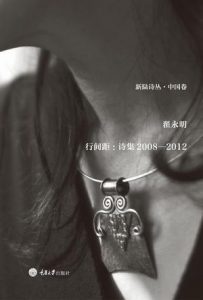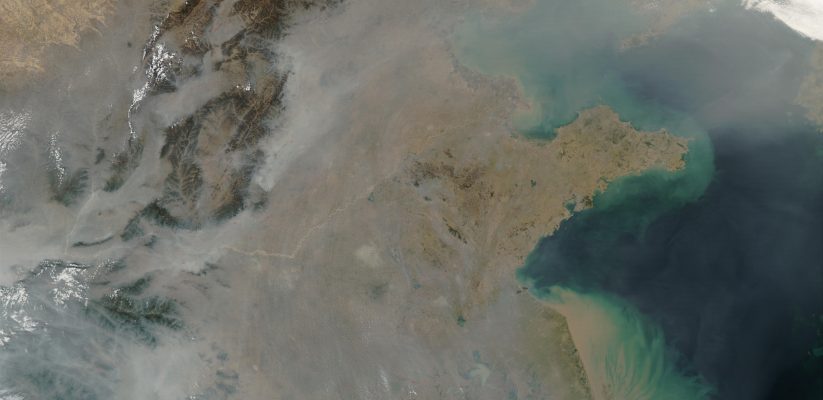Written by Justyna Jaguscik
In the 2010s, following the global virality of Chai Jing’s 柴静 movie Under the Dome (穹顶之下 Qiongding zhi xia, 2015), which addressed the impact of air pollution on children’s health from the perspective of a concerned mother, independent documentary film became the artistic medium most associated with environmental citizen activism in the People’s Republic of China. However, similar concerns have also long been voiced in other media forms less accessible to global audiences unfamiliar with the Chinese language, such as poetry.
When in 2007 I began my research on Chinese female-authored poetry, neither of the two authors I focused on, the acclaimed poet Zhai Yongming 翟永明 and the rising star of migrant workers’ poetry Zheng Xiaoqiong 郑小琼, had yet been discussed from an ecocritical perspective. In fact, their texts already displayed increasing eco-anxiety. For example, in her 1999 poem ‘How to Take Care of a Baby?’ (拿什么去关爱婴儿? Na shenme qu guan’ai ying’er?) Zhai Yongming questioned the impact of pollution on younger generations’ health. In contrast to the deeply personal tone in Chai Jing’s documentary, Zhai’s text displays an affinity with the feminist ethics of caring, taking up notions of human vulnerability and dependence on human and nonhuman others. The poem [see Note 1] comments on the unresolvable dilemma of mothers who have no alternative to feeding their babies contaminated food:
And like this before our eyes
Water turns into spirit milk turns into dioxin
Bread turns into mould
Plastic turns into garbage
. . .
I don’t know what I should eat myself
Nor do I know what to feed the baby
Sometimes we have some toxins
We eat some rust
Some DDVP
And our mouths ramble some industrial charms
The plural personal pronoun ‘we’ in this poem invokes the question of responsibility and the condition in which the natural environment is handed over by ‘us’ to the younger generations.
Furthermore, Zhai’s poem shows that roughly half a century after the last catastrophic famine in the PRC, and in a time of abundance of affordable food, the issue of malnutrition in children may, again, become acute. It indeed happened in 2008, the year of the milk scandal, when contaminated infant formula led to cases of fatal kidney damage in babies. Zhai shared her grief in the poem ‘The Child’s Dripping Song’ (儿童的点滴之歌 Ertong de diandi zhi ge), which reads like a dark, disturbing lullaby:
Little Shi Jie from Loudi in Hunan
has three tubes in his head
His mother cries out:
Mama caused the calamity
Spoon by spoon I fed him
into this condition
The anonymous infant from Zhai’s previous poem becomes, in a ghostly manner, Shi Jie, the baby unintentionally fed to death by his mother. The ‘Song’ quotes from the morbid imagery of gothic tales when it compares the profit-driven managers of milk companies to bloodsucking vampires:
Some people drink the baby’s blood some people share profits
. . .
2008’s milk is vampires’ saliva
2008’s excess is the problem
2008 was not only the year of the milk scandal, but also the year of the devastating Sichuan earthquake and of the Beijing Summer Olympics. Thus, the word ‘excess’ in the quote may be referring to much more than the milk scandal alone.

Fig 1. Cover of Zhai Yongming’s collection
The same year, Zheng Xiaoqiong wrote ‘Pedestrian Overpass’ (人行天桥 Renxing tianqiao) a long prose poem inspired by her work in factories in the manufacturing hub of the Pearl River Delta:
. . . plutonium replaces calcium in the production of saliva, soft silvery tin floats in the air, rushing into your lungs and blood vessels, arsenic eats up your sexual desire, mercury has killed the algae and fish in the rivers . . .
Toxic petroleum shines on our diseased bodies, toxic fumes and waste have contaminated the semen of our men
This is only one of many examples in Zhang’s oeuvre that depict the transformation of matter by the chemical substances that penetrate it. Drawing upon her personal experience, the poet writes about the deleterious impact of industrial waste and pollution on workers’ health. The daily contact with iron parts and tools in factories exposes them to the risk of accidents and injuries. Almost invisible, but no less dangerous, is the exposure to toxins that can lead to infertility.
Since 2007, environmental concerns have accompanied my research visits to the PRC. And not only as a literary theme, but also due to the impact of pollution on my daily life. My academic friends based in Beijing have embraced vegetarianism because of worries over meat safety and eating out has become increasingly challenging. When in 2019 I met the social scientist and labour activist Lü Tu 吕途, she told me that recurring incidents of food poisoning were a turning point in her career. Lü recalls the experience that changed her perception of the countryside:
In 2009 I began to organise the Workers’ University in the village Pinggu. . . . When I had classes, I stayed overnight in Pinggu. One day, I bought tantalisingly fresh cucumbers from a vendor next door. That evening I suffered from severe food poisoning. When the pain became unbearable in the middle of the night, I had no other choice but to clean out my stomach. (Lü 2019, see note 2)
Lü realised that the pastoral image of the countryside some of us cherish has long fallen out of sync with the reality of ‘toxic insecticide and the smell of pesticide in the air when fruit is ripening’ (Lü 2019).
Lü is mainly known for her new workers’ trilogy (Lü 2012, 2014, 2017) and her work for the Picun-based NGO Migrant Workers’ Home. In her texts she elaborates on the emotional homelessness and instability that endangers the existence of many migrant workers. Following the spike in eco-anxiety, Lü’s attention shifted from a critique of urbanisation to rural reconstruction work. With her singer-songwriter husband, Sun Heng 孙恒, Lü began a new project that focuses on reviving the tradition of village songs. Since 2019 they have been organising workshops with villagers who write their own texts, such as those created by the inhabitants of the Stone City Village (石城之村 Shicheng zhi cun):
Stone wall, stone house, the small village made of stones
One stone, four ounces oil, otherwise the grain won’t grow
Walnut scent, chestnut taste, old trees count a hundred years
Valleys filled with fresh air, and the stones smell sweet too
(quoted in Lü 2019)
Lü and Sun hope that the fostering of villagers’ emotional connections with the countryside may be the first step toward creating a healthier living environment for those, mainly older women and children, left behind by urbanisation.
These examples illustrate a growing ecological awareness on the part of engaged citizens and activists. The state’s agenda has also changed, and currently the PRC is affirming its commitment to green development. Concurrently, other globally known phenomena, such as greenwashing, have appeared. My last example comes from the short play ‘Ocean Hotpot’ (海水火锅 Haishui huoguo) by Chen Si’an 陈思安 . Her work was commissioned by the 2019 Edinburgh International Festival, which asked five writers to share their views on the global climate crisis. Chen’s absurdist piece invites the audience to the Committee for Global Ecological Balance and Environmental Promotion, where the protagonist applies for an environmental grant. He plans to turn the warming sea around the Yong Le Island into a seawater hotpot and successfully sells his costly environmental project as an ecological start-up. The play pokes fun at the superficiality of much of environmental politics. One could wonder if the playwright was targeting the organisers of the festival too? Environmental art sells and wins grants for funds, in the PRC and elsewhere.

Fig 2. Stage picture from Chen Si’an’s play ‘Ocean Hotpot. Taken by Ryan Buchanan.
Notes
1. Unless otherwise noted, all translation from Chinese are those of J. Jaguscik.
2. From unpublished lecture script; contact J. Jaguscik for more details.
Justyna Jaguscik is a senior lecturer in Chinese Language, Culture and Society at the University of Bern. She received her PhD in Chinese Studies from the University of Zurich in 2016. Jaguscik has published several papers on feminist poetry, workers’ culture and gender issues in English, Polish and German. Her current research explores grassroots cultural activism in the PRC and focuses on independent theatre productions. Feature image ‘Pollution over east China’ from Creative Commons.
- TV Drama Discourse on Stay-at-home Fathers in China: Super Dad & Super Kids - January 28, 2022
- Freud and China - January 20, 2022
- “Cultural China 2020″—A Different Take on China - January 7, 2022

[…] fourth piece in this issue comes from Justyna Jaguscik and explores the local/transnational and cross-class dimensions of Sinophone […]